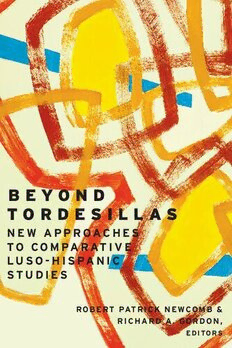
Beyond Tordesillas: New Approaches to Comparative Luso-Hispanic Studies PDF
Preview Beyond Tordesillas: New Approaches to Comparative Luso-Hispanic Studies
b e y o n d t o r d e s i l l a s N e w A p p r o A c h e s to c o m pA r At i v e Lu s o - h i s pA N i c s t u d i e s robert pAtrick Newcomb & richArd A. GordoN, editors Beyond Tordesillas New Approaches to Comparative Luso-Hispanic Studies EDITED BY Robert Patrick Newcomb and Richard A. Gordon THE OHIO STATE UNIVERSITY PRESS • COLUMBUS Copyright © 2017 by The Ohio State University. All rights reserved. Library of Congress Cataloging-in-Publication Data Names: Newcomb, Robert Patrick, editor. | Gordon, Richard A. (Richard Allen), 1969– editor. Title: Beyond Tordesillas : new approaches to comparative Luso-Hispanic studies / edited by Robert Patrick Newcomb and Richard A. Gordon. Other titles: Transoceanic studies. Description: Columbus : The Ohio State University Press, [2017] | Series: Transoceanic studies | Includes bibliographical references and index. Identifiers: LCCN 2017024726 | ISBN 9780814213476 (cloth ; alk. paper) | ISBN 0814213472 (cloth ; alk. paper) Subjects: LCSH: Comparative literature—Portuguese and Spanish. | Comparative literature—Spanish and Portuguese. | Spain—Relations—Portugal. | Portugal— Relations—Spain. | Brazil—Relations—Latin America. | Latin America—Relations— Brazil. | United States—Relations—Latin America. | Latin America—Relations—United States. | Transnationalism—Social aspects. | Culture in motion pictures. | Popular music—Social aspects—Brazil. Classification: LCC PQ9019 .B49 2017 | DDC 460—dc23 LC record available at https://lccn.loc.gov/2017024726 Cover design by Lisa Force Text design by Juliet Williams Type set in Adobe Minion Pro C O N T E N T S Acknowledgments vii INTRODUCTION Bridging Tordesillas 1 PART I LUSO-HISPANIC STUDIES AND RELATED LINES OF INQUIRY: A SERIES OF PROPOSALS CHAPTER 1 Portuguese and the Emergence of Iberian Studies PEDRO SCHACHT PEREIRA 21 CHAPTER 2 The Case for Ad Hoc Transnationalism HÉCTOR HOYOS 37 CHAPTER 3 Queer Spanish, Queer Portuguese: A Series of Research Proposals DAVID WILLIAM FOSTER 54 CHAPTER 4 Before Tordesilhas, and Beyond: The Politics of Native Agency across the Americas TRACY DEVINE GUZMÁN 64 CHAPTER 5 “Blister you all”: Sérgio Buarque de Holanda and the Calibanic Genealogy PEDRO MEIRA MONTEIRO TRANSLATED BY JAMES IRBY 82 iv CONTENTS PART II WRITTEN FICTIONAL NARRATIVE: BRAZIL AND SPANISH-SPEAKING LATIN AMERICA CHAPTER 6 The Literary Revenant in a Latin American Comparative Context ROBERT MOSER 95 CHAPTER 7 Borges, Clarice, and the Development of Latin America’s “New Narrative” EARL E. FITZ 108 CHAPTER 8 Mapping Citizenship in Luiz Ruffato’s Inferno provisório and Guillermo Saccomanno’s El pibe LEILA LEHNEN 119 PART III LUSO-HISPANIC POETRY, MUSIC, AND EXPRESSIVE CULTURE CHAPTER 9 The Parábola of the Latin American Avant-Gardes ALFREDO BOSI TRANSLATED BY ROBERT PATRICK NEWCOMB 137 CHAPTER 10 Brazilian Symbolism and Hispanic American Modernismo: Resonance across the Luso-Hispanic Divide SARAH MOODY 149 CHAPTER 11 Shared Passages: Spanish American–Brazilian Links in Contemporary Poetry CHARLES A. PERRONE 162 CHAPTER 12 Cantigas de amigo: Galicia and Brazil in the Lusophone Musical Space FREDERICK MOEHN 173 PART IV LUSO-HISPANIC CINEMA, PERFORMANCE, AND VISUAL CULTURE CHAPTER 13 Cartography of Dissidence: In/visibility and Urban Display in Luso-Hispanic Street Projects TINA ESCAJA 191 CHAPTER 14 Memory, Youth, and Regimes of Violence in Recent Hispanic and Lusophone Cinemas LESLIE L. MARSH 204 CONTENTS v CHAPTER 15 Cinema in Totalitarian Iberia: Propaganda and Persuasion under Salazar and Franco PATRÍCIA VIEIRA 220 CHAPTER 16 Globalization and Documentary Film: Luso-Hispanic Reflections MICHAEL J. LAZZARA 234 List of Contributors 249 Index 252 A C K N O W L E D G M E N T S THE EDITORS would like to recognize: first and foremost, our contributors, who have made this volume what it is; Iliana Rodríguez, editor of the Trans- oceanic Series, for her support of this project; Lindsay Martin and The Ohio State University Press, for guidance and patience; our anonymous external reviewers, who provided crucial feedback. Robert Patrick Newcomb would like to thank his colleagues at the Uni- versity of California, Davis, and Kelley Weiss, for her love and support. Richard A. Gordon would like to thank his colleagues at The Ohio State University and the University of Georgia. vii I N T R O D U C T I O N Bridging Tordesillas ROBERT PATRICK NEWCOMB RICHARD A. GORDON PERHAPS NO two literary and cultural traditions share such a natural affinity through both language and history, and yet so consistently resist comparative study, as do those of the former Spanish and Portuguese colonial empires. Of the major Romance languages, Spanish and Portuguese are the most closely related, having only diverged from one another in the Middle Ages. Today, Spanish and Portuguese are to a significant degree mutually intelligible, and in certain border regions the two languages bleed into each other, as occurs on portions of the Brazilian-Uruguayan frontier. Similarly, the histories of the Portuguese and Spanish states, and of Brazil and the Spanish-speaking republics of Latin America, have been closely intertwined. Portugal and Spain are the modern products of a centuries-long process of often-linked political evolution on the Iberian Peninsula, a landmass set apart from the rest of the European continent by the Pyrenees, and which the Portuguese novelist José Saramago imagined as a cultural—and literal—island in his speculative novel A Jangada de Pedra (The Stone Raft, 1985). Having been bonded in protean form during the Roman, Visigothic, and Muslim periods of rule in Iberia, much of what would become Portugal and Spain embarked during the Middle Ages on parallel processes of peninsular reconquista. In the late fifteenth and sixteenth centuries the two kingdoms undertook Europe’s first modern over- seas colonization projects, expanding into the Americas, Africa, and Asia and becoming imperial rivals. Between 1580 and 1640, Spain and Portugal were united under the Spanish Habsburgs, and while they have remained politically 1
